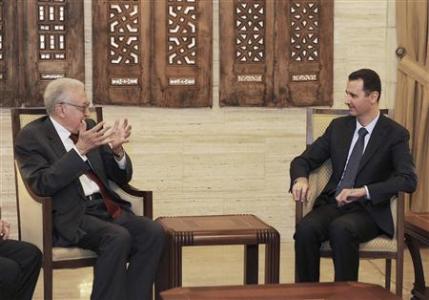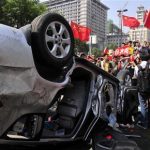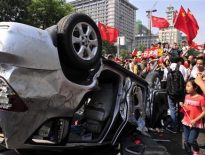(Reuters) – International mediator Lakhdar Brahimi said after talks with President Bashar al-Assad on Saturday that the escalating Syrian conflict posed a global threat.

Activists say more than 27,000 people have been killed in the 18-month-old uprising against Assad, which started as mainly peaceful calls for reform but has become a bloody insurgency which is deepening sectarian tensions in the Middle East.
“This crisis is deteriorating and represents a danger to the Syrian people, to the region, and to the whole world,” Brahimi told reporters in Damascus after he spoke with Assad for an hour at the presidential palace.
It was Brahimi’s first meeting with Assad since he replaced Kofi Annan as mediator two weeks ago, taking on a mission which the veteran Algerian diplomat described as “nearly impossible”.
Assad’s forces and the outgunned but increasingly effective rebel fighters seeking his overthrow have ignored appeals to end the conflict, which has continued in most of the country’s main cities, including Damascus, Aleppo, Homs and Deir al-Zor.
Damascus residents reported hearing heavy overnight bombardment followed by the sound of jet planes swooping over the capital shortly after 7 a.m. (0400 GMT) on Saturday.
Some of the bombardment appeared to be targeting the southern Damascus neighborhood of Hajar al-Aswad, just days after Assad’s forces cleared rebels out of the nearby district of Tadamon.
“It’s not a secret that the gap between the parties is very wide,” Brahimi said, adding that he still believed there was “common ground” for them to resolve the crisis.
The mainly Sunni Muslim rebels are supported by Gulf Arab states and neighboring Turkey in their struggle to topple Assad, whose minority Alawite faith is an offshoot of Shi’ite Islam. Shi’ite Iran has been Assad’s staunchest ally.
BENEDICT’S APPEAL
Syrian authorities say they are fighting Islamist terrorists and accuse regional Sunni Muslim powers of worsening the bloodshed by helping arm the president’s foes.
State news agency SANA quoted Assad as telling Brahimi that the success of his mission hinged on “pressuring countries which finance and train the terrorists, and which traffic weapons to Syria, to stop these actions”.
His comments came a day after Pope Benedict, starting a three-day visit to neighboring Lebanon, branded the import of arms into Syria a “grave sin” and called for a halt to the weapons flow.
The Syrian Observatory for Human Rights, a British-based group monitoring the violence, said 160 people were killed in Syria on Friday, as Brahimi met Russian and Chinese diplomats in Damascus. On Thursday he spoke with the Iranian ambassador.
Russia, Iran and China are supporting Assad’s government and Moscow and Beijing have three times blocked Western-backed attempts in the U.N. Security Council to criticize and threaten sanctions against Damascus.
“I believe that the president realizes more than me the dimensions and the danger of this crisis,” Brahimi said.
Brahimi said Assad and his officials had pledged to support his work, adding that he would return to the region soon after talks in New York with United Nations Secretary-General Ban Ki-moon.
(Writing by Dominic Evans; Editing by Rosalind Russell)





